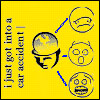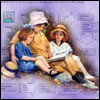| |
| |
Current and Recent Projects:
 |
|
 |
Storied Navigation
Edward
Shen,
Henry Lieberman,
Glorianna
Davenport
Today, people are able to tell stories by composing, manipulating,
and sequencing individual media artifacts using digital
technologies. However, these tools offer little help in
developing a story's plot. In this project we present
a novel approach with commonsense reasoning technology
to this problem - "Storied Navigation" - where media sequences
are tagged with free-text annotations and stored as a
collection. To tell a story, the user inputs a free-text
sentence and the system suggests possible segments for
a storied succession. This process iterates progressively,
helping the user to explore the domain of possible stories.
|
 |
|
 |
Scenario-Oriented Recommendation
Edward
Shen,
Henry Lieberman
Although Electronic Commerce on the Web is thriving, they
still have trouble finding products that will meet their
needs and desires. Based on commonsense reasoning tools,
our new recommendation technique, Scenario-Oriented Recommendation,
works even when users don't necessarily know exactly what
product characteristics they are looking for. It breaks
down boundaries between products' categories, finds the
"first example" for existing techniques like
Collaborative Filtering, and helps promote independent
brands.
|
 |
|
 |
Your Memory, Connected
James
Chao-Ming Teng, Edward
Shen,
Henry Lieberman,
Pattie Maes
Imagine a situation where you are an artist, and you
are able to ask a question or give a statement to all
the people in the world. What if you could check the
memories that are being evoked when the people are confronted
with your question or statement, and you could "steal"
those memories to create an artistic collage? Our system
uses natural language processing, concept reasoning,
and textual affect sensing techniques to collect all
the related memories from people on Flickr.
We create this computational "memory retrieval"
procedure that simulates the process of evocation when
people's brains are triggered with the typed-in statement
from the artist.
|
 |
|
 |
A
Goal-Oriented User Interface for Personalized Semantic
Search
Alex Faaborg,
Henry Lieberman
Users have high-level
goals when they browse the Web or perform searches.
However, the two primary user interfaces positioned
between users and the Web, Web browsers and search engines,
have very little interest in users' goals. Present-day
Web browsers provide only a thin interface between users
and the Web, and present-day search engines rely solely
on keyword matching. This thesis leverages large knowledge
bases of semantic information to provide users with
a goal-oriented Web browsing experience. By understanding
the meaning of Web pages and search queries, this thesis
demonstrates how Web browsers and search engines can
proactively suggest content and services to users that
are both contextually relevant and personalized.
|
 |
|
 |
Reducing Complexity in Consumer Electronic Interfaces
Jose
Espinosa,
Henry Lieberman
Consumer electronics devices are becoming more and more
complicated to the point that the user is scare to manipulate
them. These devices do not know anything about
every day life and human goals and they show irrelevant
menus and options. By using EventNet, a comonsense reasoning
plan recognizer, we build an interface with knowledge
about the userís intentions. This knowledge helps the
device to display relevant information to reach the
userís goal. For example, a living room set that knows
how to configure itself to watch the news. This leads
to a more human like interaction with these devices.
|
 |
|
 |
A
Commonsense Approach to Predictive Text Entry
Tom Stocky,
Alex Faaborg,
Henry Lieberman
People
cannot type as fast as they think, especially when faced
with the constraints of mobile devices. The focus of
this project is developing an alternative approach to
predictive text entry using Open Mind Common Sense.
|
 |
|
 |
i-Seek:
An Intelligent System for Eliciting and Explaining
Knowledge
Ashwani
Kumar, Henry
Lieberman We
propose i-Seek, an Intelligent System for Eliciting
and Explaining Knowledge that leverages the Open Mind
Commonsense knowledgebase in conjunction with domain
specific knowledge in Personal Finance, Technical Help,
and Health domains to act as an advisory system for
novice users.
|
 |
|
 |
Commonsense
Investing: Bridging the Gap between Expert and Novice
Ashwani
Kumar, Henry
Lieberman This
project aims to develop an intelligent personal-finance
advisory agent that bridges the gap between the novice
user and the expert model of the finance domain. The
agent uses common-sense reasoning and inference for
associating the user's personal life, financial situation,
and goals with the attributes of the expert domain model
and vice versa. The agent interface provides a natural-language
interface for elicitation and explanations of design
and process rationale. The architecture of the system
is domain independent and consequently, can be used
for any novice-expert domain model.
|
 |
|
 |
Anticipating
User Tasks Using Commonsense Reasoning
Alex
Faaborg, Chris
Tsai, Henry
Lieberman
The
goal of this project is to create an agent that predicts
tasks users may be interested in adding to their to-do
list, based on the context of appointments they are
adding to their calendar. The agent uses Commonsense
Reasoning to predict tasks that users are likely to
add. For instance, if the user makes the calendar appointment
ďgo fishing? the agent may recommend the task ďpack
fishing equipment.?By automatically generating potential
tasks, the agent will save userís time, and will help
them remember actions they may commonly forget.
|
 |
|
 |
Using
Commonsense Reasoning in Video Game Design
Andrew Wang, Alex
Faaborg,
Jose Espinosa,
Henry Lieberman
When
computers automatically generate video game environments,
the result is often as simplistic as a randomly generated
maze. Using the Open Mind Common Sense knowledge base,
we are exploring ways to automatically generate virtual
environments that are immersive and intelligently designed.
By allowing video games to dynamically create their
own environments, developers will be able to reduce
the time they currently spend crafting environments
by hand and focus on higher level design issues. More
importantly, games that are capable of changing their
own environments will feel less static,
resulting
in a more believable experience and an increased replay
value.
|
 |
|
 |
Using
Commonsense Reasoning to Improve Voice Recognition
Waseem Daher, Jose
Espinosa, Alex
Faaborg, Henry
Lieberman Current
voice recognition software relies on statistical techniques
to determine which words a user has said. In this project
we are attempting to leverage the semantic context of
what the user has previously said to improve future
predictions. We are using ConceptNet, a semantic network
created from the Open Mind Common Sense knowledge base
to disambiguate phonetically similar words and improve
overall recognition accuracy.
|
 |
|
 |
Using
Commonsense Reasoning to Enable the Semantic Web
Alex Faaborg,
Sakda Chaiworawitkul, Henry
Lieberman
Current efforts to build the Semantic Web have been
based on creating machine readable metadata, using XML
tags and RDF triples to formally represent information.
It is generally assumed that the only way to create
an intelligent Web agent is to build a new Web, a Web
specifically for machines, using a unified logical language.
We are attempting to solve this disparity between humans
and machines from the opposite direction, by enabling
machines to understand and reason on natural language
statements, and giving them knowledge of the world we
live in.
|
 |
|
 |
Real
Time Searches on a Local Social Network
Alex Faaborg,
Chris Tsai,
Henry Lieberman,
Judith
Donath Cell
phone contact lists represent a very large peer-to-peer
network. We are creating a cell phone based application
that allows users to perform real time searches on their
local social network, against pieces of information
that their contacts have provided about themselves.
Our matchmaking agent uses Open Mind Common Sense to
understand users?goals, and logically expand on their
queries.
|
 |
|
 |
Using
Commonsense Reasoning to Find Cultural Differences in
Text
Jose Espinosa,
Henry Lieberman
Because commonsense knowledge
differs in each culture, misunderstandings frequently
occur. Since differences can be subtle, there has been
little work in trying to detect places in text where
cultural differences might arise. We explicitly represent
commonsense knowledge of each culture in separate knowledge
bases. By analyzing the text, we can find the differences
between each culture's knowledge concerning the subject
of the text.
|
 |
|
 |
GloBuddy
2
Jose Espinosa,
Alex Faaborg,
Henry Lieberman
When
traveling in foreign countries, people often rely on
traditional phrase books for language translation.
However, these phrase books only work in a limited number
of common situations, and even common situations will
often deviate from the predefined script the phrase
book relies on. Using a vast knowledge base of
commonsense facts and relationships, GloBuddy 2 is able
to expand on the userís translation request and provide
words and phrases related to the userís situation.
|
 |
|
 |
Woodstein
Earl
Wagner, Henry
Lieberman "Follow
the Money" Woodstein, the E-Commerce Debugger, shows
users the processes that they're working with over the
web. As users fill out forms and submit data, it graphically
represents the structure of their actions. That way,
when problems occur, they're able to bring up the record
of actions they took and are able to see what went wrong.
|
 |
|
 |
Aria:
An Agent for Integrated Annotation and Retrieval of Images
Hugo Liu,
Henry Lieberman
ARIA (Annotation and Retrieval
Integration Agent) is a software agent that acts as
an assistant to a user writing email or Web pages. As
the user types a story, it does continuous retrieval
and ranking on a photo database. It can use descriptions
in the story text to semi-automatically annotate pictures
based on how they are used.
|
 |
|
 |
Emotus
Ponens
Hugo Liu,
Henry Lieberman,
Ted Selker
Psychologist William James noted that the recognition
of emotion is intimately related to traditions and culture.
Based on the thesis that much of our emotional attitudes
are dictated by our culture's "common sense" about everyday
situations, this project uses large-scale affective
commonsense from Open Mind to analyze the broad emotional
qualities of sentences.
|
 |
|
 |
MakeBelieve:
Interactive Computer Story Generation
Hugo Liu,
Push Singh
MAKEBELIEVE is a story
generation agent that uses Open Mind knowledge to interactively
compose short fictional texts with a user. While a user
must start a story, MAKEBELIEVE will attempt to continue
that story by freely imagining possible sequences of
events that might happen to the character the user has
chosen. The agent uses "commonsense" about causality
and how the world works, mined from the Open Mind Common
Sense corpus, and combines this with very simple lingustic
techniques for story generation to produce pithy but
interesting stories. MAKEBELIEVE also uses common sense
to evaluate and critique a story it has written to catch
logically inconsistent, incoherent events and actions.
|
 |
|
 |
Goal-Oriented
Web Search User Interfaces
Hugo Liu,
Henry Lieberman,
Ted Selker
A novice search engine user may find searching the Web
for information difficult and frustrating because she
may naturally express search goals rather than the topic
keywords search engines need. GOOSE (goal-oriented search
engine interface) is an adaptive search engine interface
that uses natural language processing to parse a userís
search goal, and uses "common sense" reasoning to interpret
this goal, and reason from it an effective query.
|
 |
| |
|
Previous
Projects
|
|
|
|
